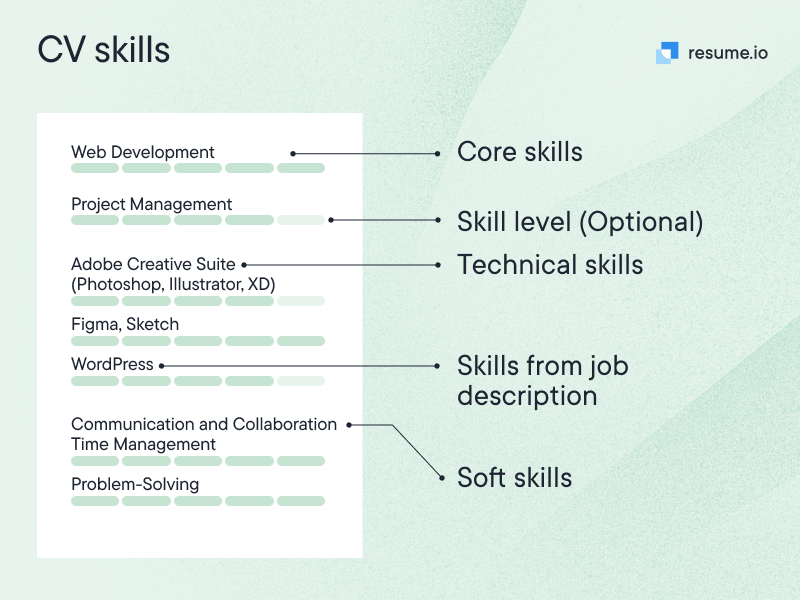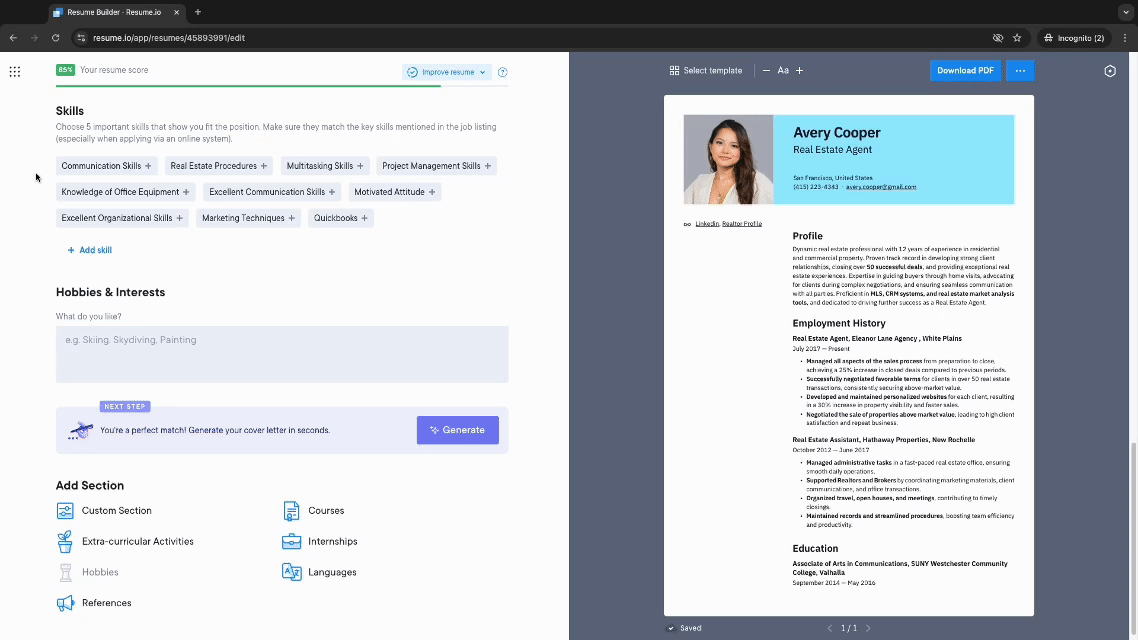When you’re applying for a job, one of your priorities is making your key strengths abundantly clear. Of course you know why you’d be an excellent asset, but the trick is to make it obvious to the hiring manager.
Within the following guide, we will take a look at:
- What are key strengths for a CV and why do they matter?
- How to list your key strengths on your CV
- How to determine which strengths to include
- Examples of key strengths to consider
What are key strengths for a CV?
Key strengths are the main skills or experiences you bring to the workplace. These could be job-specific ( hard skills) or may be related to your attitude and how you interact with the world ( soft skills).
We’re all equipped with unique talents and strengths (and weaknesses)—but it doesn’t make sense to list every single one on a CV. That’s why it’s important to identify the main strengths to help your CV give you a competitive edge.
Listing key strengths on your CV
Identifying and communicating your key strengths isn’t as simple as it sounds. Even if you generally know what you want to communicate, you may wonder how to decide which strengths to put on your CV.
Where you list your strengths on a CV also matters; your summary, employment history, or skills sections are the best places. Looking at a CV template UK can help you visualise where to showcase these strengths for maximum impact. To decide where to include your strengths, take a moment to consider the examples that showcase your best qualities in the workplace. It’s more powerful to back up your claims with proven examples, so if you, indeed, have a strong story to illustrate your strength, this strength would be well-placed in the employment history section. For instance, did you use your organisational skills to save 5% of the department’s budget on a project delivery? List this as a bullet point underneath the corresponding role.

Even though it’s advisable to illustrate your strengths through examples, there is something to be said for spelling it out to the hiring manager. That’s why the skills section of your CV is another great place to show your key strengths.
Strengths and skills: What can you list as strengths on your CV?

Your CV skills section is essentially a list of the relevant competencies that you would bring to the job. To show you’re a well-rounded candidate, make this section a good mix of both hard skills and soft skills.
However, to set yourself apart from the competition, focus on key strengths that are truly exceptional or different from what the average candidate brings to the table.
For instance, if you are applying for a journalism role, it’s expected that you’re a great communicator. It’s not worthy of being included as a key strength.
If, on the other hand, you hold a role with different key skills, like an IT technician, your top communication talents could be worth highlighting—it could bring a different angle that the hiring manager would really like to know about.
While the CV skills section may be a list of keywords, you should still be prepared to back up your claims. If the hiring manager is enticed enough to invite you for an interview, they’ll expect to hear examples of how you’ve demonstrated these strengths.
How to share your main strengths in an interview
Most of us have been asked in an interview to discuss our main strengths and weaknesses. It’s important that your CV lists your strengths, but you must be prepared for the interview stage as well.
When speaking about key skills in an interview, be ready with several examples. The STAR method may help you with this. That means breaking the task into these segments:
- S - What was the situation?
- T - What task were you given?
- A - What action did you take?
- R - What was the result?
While it may come naturally to prepare anecdotes that illustrate your key strengths, don’t forget your weaknesses. You shouldn’t list them on your CV, but you should be prepared to speak to them if asked.
If you’re asked about your weaknesses, avoid mentioning skills that are essential for the role (no one wants to hire a software developer who struggles to write code). Instead, prepare a response that demonstrates self-awareness and willingness to learn and grow. You can even consider how your key strengths have helped to compensate for any past shortcomings.
40 examples of key strengths to list on a CV
The last thing you want to do when adding strengths on your CV is go for cliches. Even perfectly admirable skills lose impact when labelled the same way repeatedly.
Think carefully about the words you want to use to communicate your key strengths. The manager may be seeking specific keywords, but you also want to strike a balance with wording that isn’t overused.
The below examples of key strengths should provide inspiration as you write your CV:
Clear communication
Communication is one skill that everyone exercises in some way at work, without exception. It can take many forms, so chances are, you can include it as a key strength.
Think of effective communication as keeping team members in the loop, expressing yourself clearly, and being proactively and transparent.
The best way to demonstrate your communication skills as a key strength on your CV? Present a CV that clearly expresses your worth to the hiring manager. Consider including skills like:
- Active listening
- Clear written communication
- Emotional intelligence
- Presentation or facilitation skills
- Strong verbal communication
- Customer service
- Training and coaching
- Executive presentation skills
Strategic thinking
Whatever field you’re in, it’s important to think strategically and understand how execution of tasks impacts the people around you, the organisation’s goals, and the bottom line. This skill, when exercised correctly, leads to outcomes that meet the company’s objectives. Strategic thinking also helps foster innovation.
You can break these into:
- Business acumen
- Critical thinking
- Innovation
- Market research
- Strategic planning
- Project roadmapping
- User research
- Prioritisation
Resourcefulness and creativity
Thinking strategically and being able to communicate well don’t mean as much if you aren’t also resourceful. That means being able to understand the bigger picture and pair that with the rest of your knowledge to propose creative ideas that solve problems.
Examples of creativity and resourcefulness may include:
- Effective resource management
- Efficiency
- Creative thinking and ideating
- Bias for action
- Taking initiative
- Complex problem solving
- Root cause analysis
- Inspirational leadership
Teamwork and collaboration
Even jobs that frequently require solo work will sometimes require teamwork or collaboration. That makes the ability to work well with others a very in-demand strength. Being a strong team player means you show up as a motivated and valued contributor, follow or lead as necessary, and bring out the best on your team.
Think about the following strengths:
- Cross-functional collaboration
- Leadership
- Performance management
- Project management
- Conflict resolution
- Negotiation
- Complex decision-making
- Meeting facilitation
Organisational skills
Employers want to know they can trust you to stay on top of your workload. In fact, many of the aforementioned key strengths won’t work as well without the ability to manage your schedule and workload.
Organisation is not just about having a colour-coded calendar. Instead, it’s about the sense of accountability for your work. A well-organised employee is far more likely to react to obstacles in an agile way, meaning deadlines and budgets are more likely to be safe.
Organisational strengths can look like:
- Attention to detail
- Budget management
- Project tracking
- Calendar management and coordination
- Document management
- Accurate data entry
- Logistics management
- Administrative assistance
Key takeaways
Regardless of exactly how you choose to communicate your key strengths on your CV, the most important task is thinking critically to decide which strengths to include.
Try to put yourself in the hiring manager’s shoes to imagine the strengths they’re targeting, then fill in the blanks about why you’re the right fit for the role and organisation. Don’t be generic—include skills that really set you apart from the competition.
For assistance crafting your CV, see our job-winning expert templates now.







